Related Research Articles

Walter Ernst Paul Ulbricht was a German communist politician. Ulbricht played a leading role in the creation of the Weimar-era Communist Party of Germany (KPD) and later in the early development and establishment of the German Democratic Republic. As the First Secretary of the Socialist Unity Party from 1950 to 1971, he was the chief decision-maker in East Germany. From President Wilhelm Pieck's death in 1960 on, he was also the East German head of state until his own death in 1973. As the leader of a significant Communist satellite, Ulbricht had a degree of bargaining power with the Kremlin that he used effectively. For example, he demanded the building of the Berlin Wall in 1961 when the Kremlin was reluctant.

The Socialist Unity Party of Germany was the founding and ruling party of the German Democratic Republic from the country's foundation in 1949 until its dissolution after the Peaceful Revolution in 1989. It was a Marxist–Leninist communist party, established in 1946 as a merger of the East German branches of the Communist Party of Germany and Social Democratic Party of Germany.
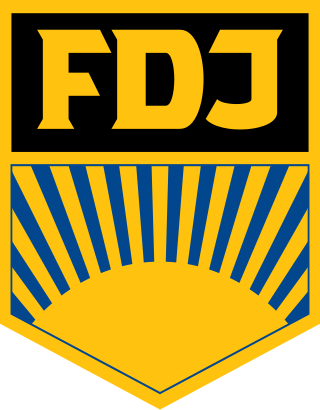
The Free German Youth is a youth movement in Germany. Formerly, it was the official youth wing of the German Democratic Republic (GDR) and the Socialist Unity Party of Germany.
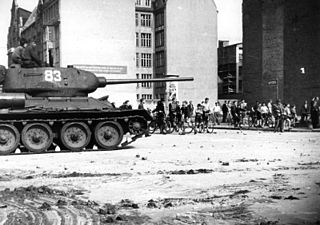
The East German uprising of 1953 was an uprising that occurred in the German Democratic Republic from 16 to 17 June 1953. It began with strike action by construction workers in East Berlin on 16 June against work quotas during the Sovietization process in East Germany. Demonstrations in East Berlin turned into a widespread uprising against the Government of East Germany and the ruling Socialist Unity Party the next day, involving over one million people in about 700 localities across the country. Protests against declining living standards and unpopular Sovietization policies led to a wave of strikes and protests that were not easily brought under control and threatened to overthrow the East German government. The uprising in East Berlin was violently suppressed by tanks of the Soviet forces in Germany and the Kasernierte Volkspolizei. Demonstrations continued in over 500 towns and villages for several more days before eventually dying out.

Wilhelm Zaisser was a German communist politician and statesman who served as the founder and first Minister for State Security of the German Democratic Republic (1950–1953).
The German Democratic Republic was created as a socialist republic on 7 October 1949 and began to institute a government based on the government of the Soviet Union during the Stalin era. The equivalent of the Communist Party in East Germany was the Sozialistische Einheitspartei Deutschlands, which along with other parties, was part of the National Front of Democratic Germany. It was created in 1946 through the merger of the Communist Party of Germany (KPD) and the Social Democratic Party of Germany (SPD) in the Soviet Occupation Zone of Germany. Following German reunification, the SED was renamed the Party of Democratic Socialism (PDS), which eventually merged with the West German Electoral Alternative for Labor and Social Justice to form the modern Left Party.
Neues Deutschland is a left-wing German daily newspaper, headquartered in Berlin.
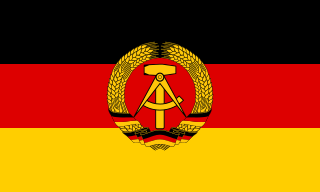
The German Democratic Republic (GDR), German: Deutsche Demokratische Republik (DDR), often known in English as East Germany, existed from 1949 to 1990. It covered the area of the present-day German states of Mecklenburg-Vorpommern, Brandenburg, Berlin, Sachsen, Sachsen-Anhalt, and Thüringen. This area was occupied by the Soviet Union at the end of World War II excluding the former eastern lands annexed by Poland and the Soviet Union, with the remaining German territory to the west occupied by the British, American, and French armies. Following the economic and political unification of the three western occupation zones under a single administration and the establishment of the Federal Republic of Germany in May 1949, the German Democratic Republic was founded on 7 October 1949 as a sovereign nation.

The Ulbricht Group was a group of exiled members of the Communist Party of Germany and the National Committee for a Free Germany, led by Walter Ulbricht, who flew from the Soviet Union back to Germany on April 30, 1945. Composed of functionaries from the KPD and ten anti-fascist prisoners of war, their job was to seek out anti-fascist individuals and prepare the groundwork for the re-establishment of communist organizations and unions in postwar Berlin. There were two additional regional groups, the Ackermann Group in Saxony and the Sobottka Group in Mecklenburg. Many of the group's members later became high-level officials in the government of the German Democratic Republic (GDR).

Charlotte "Lotte" Ulbricht was a Socialist Unity Party of Germany (SED) official and the second wife of the East German leader Walter Ulbricht.

Rudolf Herrnstadt was a German journalist and communist politician. After abandoning his law studies in 1922, Herrnstadt became a convinced communist. Despite his bourgeois origins, he was accepted into the Communist Party of Germany (KPD) in 1931 and worked for the Soviet military intelligence service Glawnoje Raswedywatelnoje Uprawlenije. As a foreign correspondent for the Berliner Tageblatt, he worked in Prague (1930), Warsaw and Moscow (1933). He emigrated to the Soviet Union in 1939, days before the Invasion of Poland, where he was active in the fight against the Nazi state as editor-in-chief of the newspaper Freies Deutschland in the National Committee for a Free Germany from 1944 during the German-Soviet War.
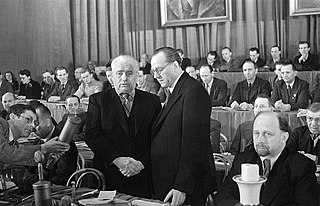
The Communist Party of Germany (KPD) and the east German branches of the Social Democratic Party of Germany (SPD) merged to form the Socialist Unity Party of Germany (SED) on 21 April 1946. Although nominally a merger of equals, the merged party quickly fell under Communist domination and developed along lines similar to other Communist Parties in what became the Eastern Bloc. The SED would be the only party of the German Democratic Republic until the end of the republic in December 1989. In the course of the merger, about 5,000 Social Democrats who opposed it were detained and sent to labour camps and jails.

Karl Maron (1903–1975) was a German politician, who served as the interior minister of East Germany. He also assumed different posts in East Germany's government.

Erich Grützner was an East German Trades unionist and a senior official in the country's ruling SED (party).

Ingeburg "Inge" Lange was an East German politician.
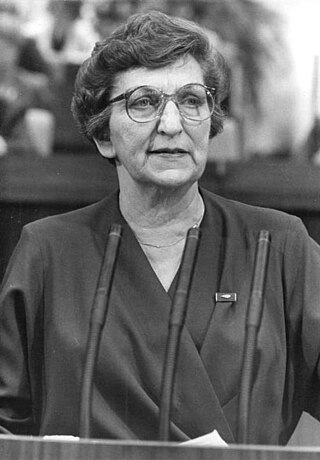
Ilse Thiele was an East German politician. She was a member of the powerful Central Committee of the country's ruling SED (party) between 1954 and 1989. She served as the Chair of the national Democratic Women's League from 1953 till 1989.
Margarete "Grete" Fuchs-Keilson was a German politician and official in the Communist Party of Germany (KPD) and the Socialist Unity Party of Germany (SED).
Rudi Wetzel was a German political activist who became an East German journalist and newspaper editor after the Second World War.

Einheit – Zeitschrift für Theorie und Praxis des Wissenschaftlichen Sozialismus was the theoretical journal of the Socialist Unity Party of Germany.
References
- 1 2 3 4 John Brown Mason (June 1959). "Government, Administration, and Politics in East Germany: A Selected Bibliography". American Political Science Review . 53 (2): 518. doi:10.2307/1952161. JSTOR 1952161. S2CID 251095627.
- 1 2 "Lista dei periodici. N" (in Italian). Fondazione Gramsci Emilia-Romagna. Retrieved 10 July 2022.
- 1 2 Randall L. Bytwerk (1999). "The failure of the propaganda of the German democratic republic". Quarterly Journal of Speech . 85 (4): 409. doi:10.1080/00335639909384271.
- ↑ Melvin Croan (May 1959). "Book review". The Journal of Politics . 21 (2): 335. doi:10.2307/2127176. JSTOR 2127176.
- ↑ "Briefly Noted" (PDF). CIA. 16 January 1967. Retrieved 10 July 2022.
- ↑ Peter Grieder (1999). The East German Leadership, 1946–73: Conflict and Crisis. Manchester; New York: Manchester University Press. p. 4. ISBN 978-0-7190-5498-3.
- ↑ C.M. (August 1962). "Ulbricht: Khrushchev's Man in Germany". Communist Affairs. 1 (2): 22. JSTOR 45367976.